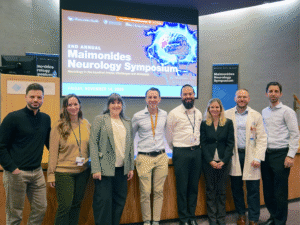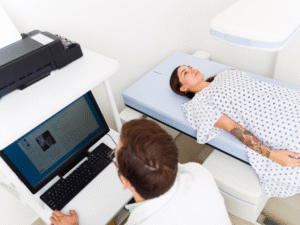June is LGBTQIA+ Pride Month! While celebrations are underway across New York City, it’s important for members of the community to remember that resources are in place to support them. Higher risk of depression, anxiety, and suicide, lack of acceptance, social stigma, isolation, and discrimination are among the challenges LGBTQIA+ individuals may face at any age.
For any of these challenges and many more, Maimonides’ LGBTQIA+ Mental Health Clinic offers comprehensive, personalized support for all members of this diverse community. Its professional team of providers, including doctors and social workers, has extensive experience and expertise in the area of LGBTQIA+ mental health care.
“Many of our clinicians have lived experience within the community themselves,” said Deepan Singh, MD, Vice Chair of Ambulatory Psychiatry Services at Maimonides. “This diversity of backgrounds and perspectives enables the clinic to offer a comprehensive approach that understands and addresses the unique challenges faced by LGBTQIA+ individuals.”
Comprehensive, Collaborative Care Improves Patient Outcomes
The Clinic provides care to patients of all ages, including pediatric, adult, and geriatric, as well as families, partners, and loved ones of LGBTQIA+ individuals. Services include individual therapy, group therapy, family therapy, psychiatric evaluations, medication management, and referrals to other resources within the medical center or the broader community. Particularly, the Clinic works closely with Maimonides’ endocrinology department and the Life Forward Program, allowing seamless referrals and collaboration between experts for specialized care for LGBTQIA+ individuals.
“For transgender and nonbinary individuals, access to gender-affirming healthcare is crucial,” said Dr. Singh. “Collaborating closely with the endocrinology clinic allows for integrated care in providing hormone therapy, monitoring hormone levels, and addressing any physical health concerns related to gender transition while the mental health needs that may arise during the process of transition are being cared for.”
Together with the Life Forward Program, the Clinic provides LGBTQIA+ patients living with HIV the support they need to cope with or overcome the mental health challenges of this condition, like anxiety, depression, and stigma-related stress.
A Welcoming, Inclusive Environment
For many patients who require a space where their unique identity and experiences are fully recognized and respected, the LGBTQIA+ Clinic is a place that can provide affirming, professional care, especially for LGBTQIA+ youth who may be seeking this kind of care for the first time.
“The staff is knowledgeable about LGBTQIA+ issues, including the intersections of gender identity, sexual orientation, and cultural backgrounds”, said Dr. Singh. “Affirming language, inclusive forms, and gender-neutral facilities are utilized to ensure a safe space for all patients. The clinic demonstrates cultural competence by understanding and addressing the diverse needs of the LGBTQAI+ community. This includes sensitivity to the experiences of different sexual orientations, gender identities, ethnicities, religions, and socioeconomic backgrounds.”
Operating with a community mindset is key to the Clinic. Opportunities like attending group therapy are great ways for individuals to connect with peers and support each other, fostering a sense of belonging. Family therapy allows loved ones of LGBTQIA+ individuals to gain a better understanding and acceptance of identity, improving family relationships and strengthening support systems in a culturally competent way.
“Both group and family therapy can empower LGBTQIA+ individuals to become advocates for themselves and others,” Dr. Singh said. “Through therapy, individuals can develop a stronger sense of self, confidence, and assertiveness. They can gain the tools and skills necessary to navigate systems, advocate for their rights, and educate others about LGBTQIA+ issues, ultimately contributing to broader societal change.”
The clinic also actively engages with the LGBTQIA+ community, participating in community events and advocating for LGBTQIA+ mental health issues.
Health Equity Plan Will Allow Providers to Better Understand Care and Needs of LGBTQIA+ Community
As an organization, Maimonides is constantly advancing to provide better, more equitable care to all patients, and this requires an understanding of the unique needs of all communities, whether they be geographical, ethnic, racial or based around gender and sexual identity. Maimonides’ Health Equity Program supports its vision to be accessible, compassionate, and strive to perform at the highest possible level, as well as its values of diversity, equity, and inclusion, among others.
Maimonides is improving the way it cares for the LGBTQIA+ community by implementing demographic data collection in order to better identify and understand this population’s health disparities. As part of Maimonides’ 2023-2025 Health Equity Plan, sexual orientation, gender identity, and sex assigned at birth can all be included in electronic health records. This data collection will always be optional and voluntary to ensure protection of individual privacy.
For more information on the Maimonides LGBTQIA+ Mental Health Clinic, visit https://maimo.org/treatments-care/mental-and-behavioral-health/maimonides-lgbtqia-mental-health-services/ or call (718) 283-2727.




